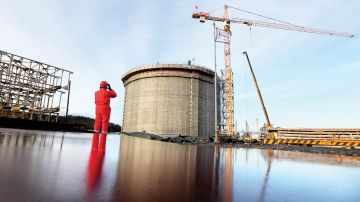FOR a nation that blazed the path to industrialisation and mass production in the 18th and 19th centuries, the truth is hard to bear.
For the first time ever, the UK’s manufacturing share of the UK economy fell to 9.4% – the lowest point on record.
For INEOS Founder and Chairman Jim Ratcliffe, who grew up in the industrial North of England, it troubles him greatly.
“We are watching the slow death of manufacturing in this country,” he said. “We have lost half of our manufacturing in a single generation.”
Twenty years ago, he said, it was on a par with Germany where manufacturing is still strong.
“This seismic shift in UK manufacturing may seem like a minor tremor in ‘services rich’ London, and much of the southern counties, but it is a catastrophe in slow motion in many parts of the North of England, Wales and Scotland,” he said.
In October last year the Redcar steelworks on Teesside shut down with the loss of 2,200 jobs after Sahaviriya Steel Industries UK, the plant’s Thai owners, went into liquidation. Labour MP Anna Turley described it in The Northern Echo newspaper as a ‘human and industrial tragedy’.
“Steelmaking is finished on Teesside,” said one man who had worked at the plant for 30 years.
In the 1970s, more than 200,000 people worked in the UK steel industry. Today there are about 30,000 but their jobs are no longer safe.
In January more job cuts were announced. Tata Steel confirmed 750 job losses at Port Talbot in Wales with hundreds of others facing the axe at its plants in Scunthorpe, Trostre, Corby and Hartlepool. A flood of cheap Chinese imports – steel production is subsidised in China – the strength of the British pound, and high energy costs in the UK have been blamed.
Whatever the reason, it’s a worrying trend.
“If we want to arrest the decline in manufacturing, or even return to growth, we need to give corporations reasons to invest in Britain,” said Jim. “We need competitivelypriced energy, a skilled workforce, attractive taxes and a government that wants to make it happen.”
He said Britain needed what the marketing men called USPs – unique selling points.
“Germany has them,” he said. “It has a highly skilled workforce, it is seated in the heart of Europe and it has great manufacturing infrastructure and competent suppliers. America has cheap energy thanks to shale gas, a skilled workforce and the world’s largest market. China has growth, cheap labour and a huge market.”
It is not the first time Jim has spoken out about Britain’s failure to sell itself to investors.
Three years ago he warned that Britain was not an attractive place to manufacture. In an interview with Alistair Osborne, The Daily Telegraph’s business editor, he cited the high price of energy. And understandably so, given that INEOS’ Runcorn plant, which provides the chlorine for 95% of Britain’s water, consumes as much energy as the city of Liverpool.
He said the UK had to look at what it had to offer if it wanted to understand why it had fallen so woefully behind the pack.
“It would be nice if there was a simple crisp answer but there is not,” he said. “To maintain or grow manufacturing, one needs a constant stream of investment as plants grow old and products grow old. New plants and new products need investment.”
Britain, he said, needed cheap or at least competitively-priced energy.
“We cannot offer that at the moment. And, with the North Sea running out of gas, the position is likely to get worse,” he said. “But we are sitting on huge shale gas deposits which could change everything.”
In the 18th century, Britain built its wealth on its coal reserves which were abundant and easily mined. And it triggered the Industrial Revolution, with Britain very much at the forefront of change.
Access to cheap energy, though, is not the only thing worrying the UK’s manufacturing industry today.
Jim also highlighted the need for a skilled workforce.
“We used to have excellent apprenticeship schemes, Polytechnics and Technical Colleges,” he said. “But government decided all young people needed to become graduates.”
That concern is shared by many. A recent survey of British manufacturers – published in the Annual Manufacturing Report 2016 – shows the shortage of skills remains their greatest fear.
“To put it bluntly, our education system is failing our youngsters and, consequently, creating problems for industry,” said Callum Bentley, Editor of The Manufacturer.
“No one expects a fresh-faced youngster will have the skills and experience of a veteran but this is about being poorly prepared for work and it has been going on for decades,” he said. “The longer it continues the more it will compromise our competitiveness. The gap in understanding between schools and workplaces must be bridged, for the sake of our manufacturing base and for our people themselves.”
Jim said it had been ‘uplifting’ to hear talk of a Northern Powerhouse – a Government initiative to redress the North-South economic imbalance – and described the current UK Conservative government as the most pro-manufacturing for many years.
But, he said, to actually make a difference, Britain needed to attract investors.
“Investors can afford to be very ‘picky’ in today’s highly competitive world,” he said. “INEOS has chosen to invest much of its capital in the USA. Many other companies have chosen the Far East.”
Jim called on the British Government to offer 100% capital allowances for manufacturing capital expenditure and a single digit tax rate for manufacturing.
“In today’s globalised world investment decisions are always compared and contrasted with alternative locations abroad. The UK is not currently a target for manufacturing investment because it lacks USPs. It needs some.”
Late last year ResPublica, an independent, nonpartisan think tank based in Westminster, said a huge increase in exports was needed to revitalise British manufacturing and move the economy away from a ‘dangerous reliance on service industries’.
Director Phillip Bond said foreigners buying UK property had driven up the value of the pound, making life harder for manufacturers to export.
“The recent collapse of the British steel industry has highlighted the worrying fact that our economy is over-reliant on services and external finance,” he said. “Growth needs to come from the long-neglected manufacturing sector where exports have been hit by a strong pound. Sterling has a key role to play in helping exports and we need to address the problem of unfavourable exchange rates for British business.”
One who would agree with this is Jim.
“Any balanced economy needs to reflect to some extent the manner in which its inhabitants spend the money in their pockets. If the inhabitants buy ‘things’ with their earnings, we need to make ‘things’ in our domestic economy. If not we have to bring all manufactured goods in from overseas and pay for them in foreign currency.”
BRITAIN MUST RE-INDUSTRIALISE
A FORMER journalist on the Financial Times said INEOS Chairman Jim Ratcliffe was right to be concerned about the state of manufacturing in the UK.
Peter Marsh said both the steel industry and the chemical industry had faced extreme problems.
“De-industrialisation – manufacturing’s shrinking share of the UK’s economic output – has gone far enough,” he said. “If we are to have sustainable economic growth and higher living standards, Britain must re-industrialise.”
But Mr Marsh, a former manufacturing editor on the FT, said although Britain had lost ground, it was still a big manufacturer of niche products, such as specialist analytical instruments, and goods which it didn’t make sense to import.
“That can be anything from foodstuffs to mattresses and building materials,” he said.
According to the latest UN figures, Britain is the 10th biggest manufacturer in the world, making just under 2% of the world’s manufactured goods – compared to 1895 when it made 18% of all goods.
“Britain is not anything like as big as it was but for a country with 1 per cent of the global population it still punches above its weight,” he said. “China has come from a lowly position in the past 20 years and now is responsible for about 20% of total factory made goods. But it does have 20% of the world population.”
Mr Marsh is now a lecturer and author of The New Industrial Revolution: Consumers Globalization and the End of Mass Production. He also recently set up a website for UK manufacturing www.madeherenow.com
















